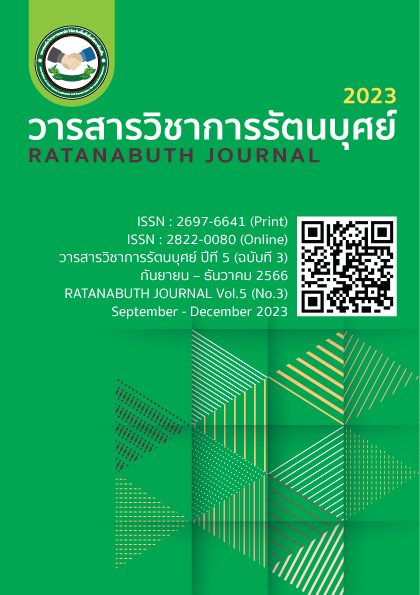The Development of Cooperation Pattern in the Teacher’s Professional Experience Faculty of Education, Loei Rajabhat University The Development of Cooperation Pattern in the Teacher’s Professional Experience Faculty of Education, Loei Rajabhat University
Main Article Content
Abstract
The objectives of this research are: 1) Develop a collaborative model for teacher professional experience training. Bachelor of Education Program (4 years), Faculty of Education, Loei Rajabhat University. 2) Study the effect of using the cooperation model on student performance. The research has 4 phases: Phase 1: Study of documents, theories, and related research. Survey of problem conditions. Phase 2: Creating a model and examining the elements of the collaborative network. Phase 3: Model trial and phase 4 evaluates the use of the model in schools. The sample size include: 1) 15 schools in the teacher professional training network there are a total of 243 students practicing teaching professional experience. 2) Administrators, mentor teachers in schools in the experience training network 3) Supervising teachers. The research tools used were 1) a focus group recording form. 2) Questionnaire of expert opinions regarding usefulness possibility Suitability and correctness of the format. 3) Student competency assessment form Teacher professional experience training. Statistics used in data analysis are percentage, mean, and standard deviation.
The results of the research showed that the development of a collaborative patterns in the teacher's professional experience consisted of six stages: 1) realization of the need for networking, 2) coordination of networking agencies, 3) joint alliance-building, 4) network management, 5) relationship development, 6) continuous relationship-keeping. The evaluation found that the cooperative patterns in the teacher's professional experience, in the opinion of the management, was at the most inclusive level (= 4.69, S.D. = 0.38). This showed that students who trained teachers' experience in co-production institutions that were the target group of the research were more efficient. The teacher's career experience level was better.
Article Details

This work is licensed under a Creative Commons Attribution-NonCommercial-NoDerivatives 4.0 International License.
References
กระทรวงศึกษาธิการ. (2546). พระราชบัญญัติการศึกษาแห่งชาติ พ.ศ.2542 และที่แก้ไขเพิ่มเติม (ฉบับที่ 2) พ.ศ. 2545. กรุงเทพฯ: กระทรวงศึกษาธิการ.
นัจรีภรณ์ ทุมสงคราม. (2556). การพัฒนารูปแบบการนิเทศการศึกษาของสำนักงานเขตพื้นที่การศึกษาประถมศึกษาในภาคตะวันออกเฉียงเหนือ. วิทยานิพนธ์ปริญญาครุศาสตรปรัชญาดุษฎีบัณฑิต สาขาวิชาการบริหารการศึกษา คณะครุศาสตร์.เลย: มหาวิทยาลัยราชภัฏเลย.
บุญชม ศรีสะอาด. (2546). การวิจัยสาหรับครู. กรุงเทพฯ. สุวีริยาสาส์น.
พรชัย ทองเจือ. (2550). การพัฒนารูปแบบความร่วมมือระหว่างสถาบันอุดมศึกษากับโรงเรียน ในการเปลี่ยนผ่านด้านการเรียนการสอนในโรงเรียน. วิทยานิพนธ์ปริญญาครุศาสตรดุษฎีบัณฑิต สาขาวิชาอุดมศึกษา ภาควิชานโยบายการจัดการและความเป็นผู้นาทางการศึกษา คณะครุศาสตร์. กรุงเทพฯ:จุฬาลงกรณ์มหาวิทยาลัย.
พิสิฐ เทพไกรวัล. (2554). การพัฒนารูปแบบเครือข่ายความร่วมมือเพื่อพัฒนาคุณภาพการจัดการศึกษาในโรงเรียนประถมศึกษาขนาดเล็ก. รายงานวิจัย คณะศึกษาศาสตร์.ขอนแก่น: มหาวิทยาลัยขอนแก่น.
ไพฑูรย์ สินลารัตน์. (2559). การศึกษาไทย 4.0 : ปรัชญาการศึกษาเชิงสร้างสรรค์และผลิตภาพ.กรุงเทพฯ: โรงพิมพ์แห่งจุฬาลงกรณ์มหาวิทยาลัย.
ไพฑูรย์ สินลารัตน์ และคณะ. (2550). โครงการวิจัยการพัฒนารูปแบบการจัดการเรียนการสอน CRP. กรุงเทพฯ: โรงพิมพ์แห่งจุฬาลงกรณ์มหาวิทยาลัย.
ศิริชัย กาญจนวาสี และคณะ. (2559). ยุทธศาสตร์การกระจายอำนาจการจัดการศึกษา. กรุงเทพฯ:สำนักงานเลขาธิการสภาการศึกษา กระทรวงศึกษาธิการ.
สิรินาถ จงกลกลาง. (2564). การออกแบบการเรียนรู้ตามแนวทางการจัดการศึกษาที่เน้นผลลัพธ์การเรียนรู้สู่สมรรถนะ [เอกสารประกอบการบรรยาย]. นครราชสีมา: คณะครุศาสตร์ มหาวิทยาลัยราชภัฏนครราชสีมา.
สุคนธ์ สินธพานนท์. (2558). การจัดการเรียนรู้ของครูยุคใหม่...เพื่อพัฒนาทักษะของผู้เรียนในศตวรรษที่ 21. กรุงเทพฯ: 9119 เทคนิคพริ้นติ้ง.
สำนักงานเลขาธิการคุรุสภา. (2562). ข้อบังคับคุรุสภา ว่าด้วยมาตรฐานวิชาชีพ (ฉบับที่ 4) พ.ศ. 2562. ค้นเมื่อ 1 มิถุนายน 2562 จาก http://www.ksp.or.th/ksp2018/2018/11/1811/.
สำนักงานเลขาธิการสภาการศึกษา. (2562ก). เข้าใจสมรรถนะอย่างง่าย ๆ ฉบับประชาชนและเข้าในหลักสูตรฐานสมรรถนะอย่างง่าย ๆ ฉบับครู ผู้บริหาร และบุคลากรทางการศึกษา. กรุงเทพฯ: 21 เซ็นจูรี่.
สำนักงานเลขานุการของคณะกรรมการยุทธศาสตร์ชาติ. (2562). ยุทธศาสตร์ชาติ พ.ศ. 2561 – 2580. พิมพ์ครั้งที่ 2. กรุงเทพฯ: (มปท.).
อมรรัตน์ วัฒนาธร. (2551). รายงานการวิจัยเรื่องการจัดการเรียนการสอนแบบตกผลึกในระดับบัณฑิตศึกษา. พิษณุโลก: มหาวิทยาลัยนเรศวร.
OECD/CERI. (2004). Innovation in the Knowledge Economy: Implications for Education and Learning Systems. Paris.


